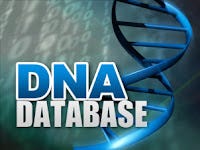U.S. Supreme Court ruled that police don't need a search warrant to create a DNA database of Americans

The U.S. Supreme Court ruled today that police don't need a search warrant before they open your mouth and take a swab of DNA if you've been arrested for a "serious crime." The ruling means police can take DNA samples from anyone arrested on a felony charge. (Big Brother won't wait until your proven guilty if you've e been accused of a felony they'll take your DNA)
The Supreme Court ruled in a 5-4 decision that DNA swabs are a "legitimate police booking procedure" that is allowed under the Constitution just like fingerprinting and mugshots.
The court's swing voter Justice Anthony Kennedy wrote the majority opinion, which said DNA identification has become an important tool to help police identify suspects.
Justice Antonin Scalia, one of the court's most outspoken conservatives, wrote the dissenting opinion that was joined by three of the court's liberal justices. Scalia's dissent questioned Kennedy's assertion that DNA helps police identify suspects.
"The court's assertion that DNA is being taken, not to solve crimes, but to identify those in the state's custody taxes the credulity of the credulous," Scalia wrote.
“Make no mistake about it: because of today’s decision, your DNA can be taken and entered into a national database if you are ever arrested, rightly or wrongly, and for whatever reason,” Scalia warned in a dissenting opinion.
Scalia suggested that the United States’ founding fathers would not be so willing “to open their mouths for royal inspection.”
David Duncan, a criminal defense attorney, said the court’s decision erodes the protection offered by the Fourth Amendment.
“It’s a terrific invasion of privacy. It’s like you’re now forever on the government’s books, and that’s it,” Duncan said
“All of us should be alarmed by this significant step towards government as Big Brother. The excessive concentration of power in government is always inimical to liberty, and a national database of our DNA cannot be reconciled with the Fourth Amendment" said Senator Ted Cruz.
The Supreme Court's decision upholds a Maryland law that was challenged by Alonzo King, whose DNA was taken after he was arrested for pointing a gun at a group of people. Police matched his DNA to a rape that had gone unsolved for six years.
King was convicted of the rape and was given a life prison sentence.
http://www.businessinsider.com/supreme-court-ruling-in-maryland-v-king-2013-6
http://bostonherald.com/news_opinion/local_coverage/2013/06/law_enforcement_lauds_dna_ruling_but_activists_cry_foul
Today’s U.S. Supreme Court ruling undermines our constitutional rights:
Today’s unfortunate U.S. Supreme Court ruling in Maryland v. King, by a vote of 5-4, expands government power, invades our liberty, and undermines our constitutional rights. The Court held that the police can forcibly take DNA samples from people who have been arrested — but have not been tried or convicted — of a serious offense. So now the government can capture, without a search warrant, the most personal information about an individual, and use it to search vast databases for unrelated offenses.
All 50 States already collect DNA from convicted felons. So this intrusion of liberty will matter only for those not convicted: the innocent and wrongly accused or those for whom there is insufficient evidence to convict.
As Justice Scalia rightly noted in dissent, “As an entirely predictable consequence of today’s decision, your DNA can be taken and entered into a national DNA database if you are ever arrested, rightly or wrongly, and for whatever reason.”
All of us should be alarmed by this significant step towards government as Big Brother. The excessive concentration of power in government is always inimical to liberty, and a national database of our DNA cannot be reconciled with the Fourth Amendment.
Accumulating DNA from arrestees — without warrant or probable cause to seize the DNA — is not designed to solve the crime for which the person has (rightly or wrongly) been arrested. Rather, it’s to test the DNA against a national database to potentially implicate them in other unsolved crimes. But the Constitution requires particularized suspicion of a specific crime; indeed, the Fourth Amendment was adopted to prohibit the British practice of “general warrants” targeting individuals absent specific evidence of wrongdoing.
If the government has good cause for needing the DNA sample — such as trying to match DNA at a crime scene to a particular person where there is other corroborating evidence — then the government can ask a judge for a search warrant. That’s what our Framers intended — judicial checks on extensive government power to invade our personal lives.
Law enforcement is a paramount function of government. But we cannot allow that government function to run roughshod over the Bill of Rights. And, as recent events involving the IRS have demonstrated, unchecked government power — and intrusive personal databases maintained on the citizenry — poses real risks to our liberty.
http://www.volokh.com/2013/06/03/sen-ted-cruz-r-tx-sides-with-dissent-in-maryland-v-king/


